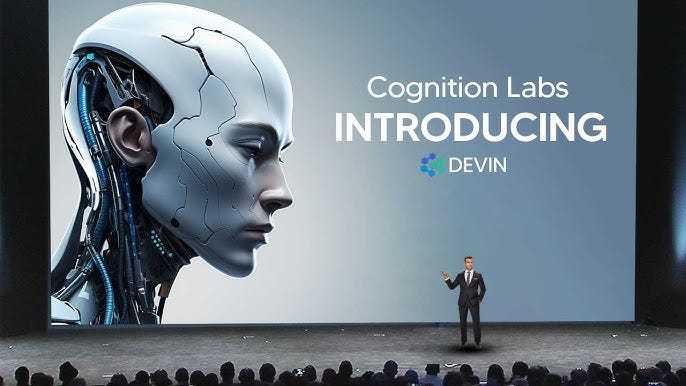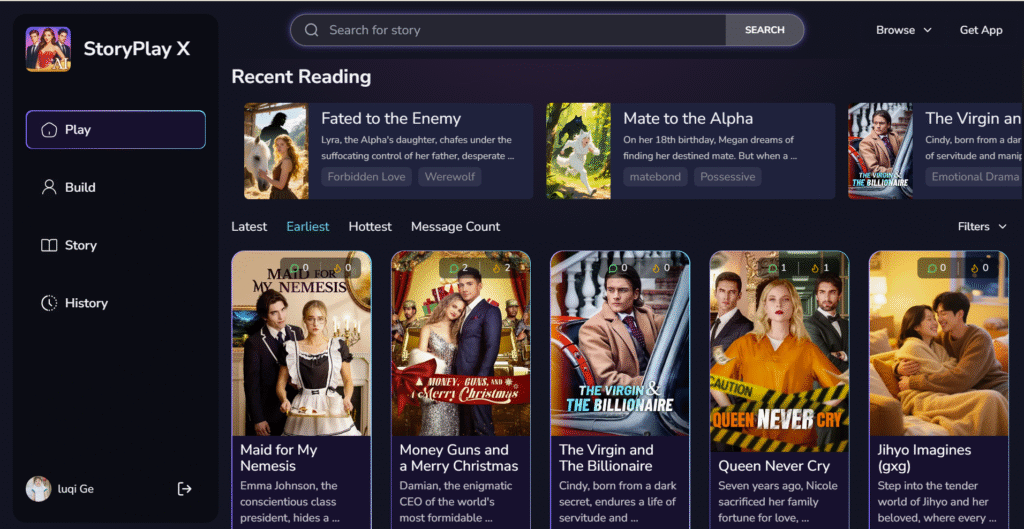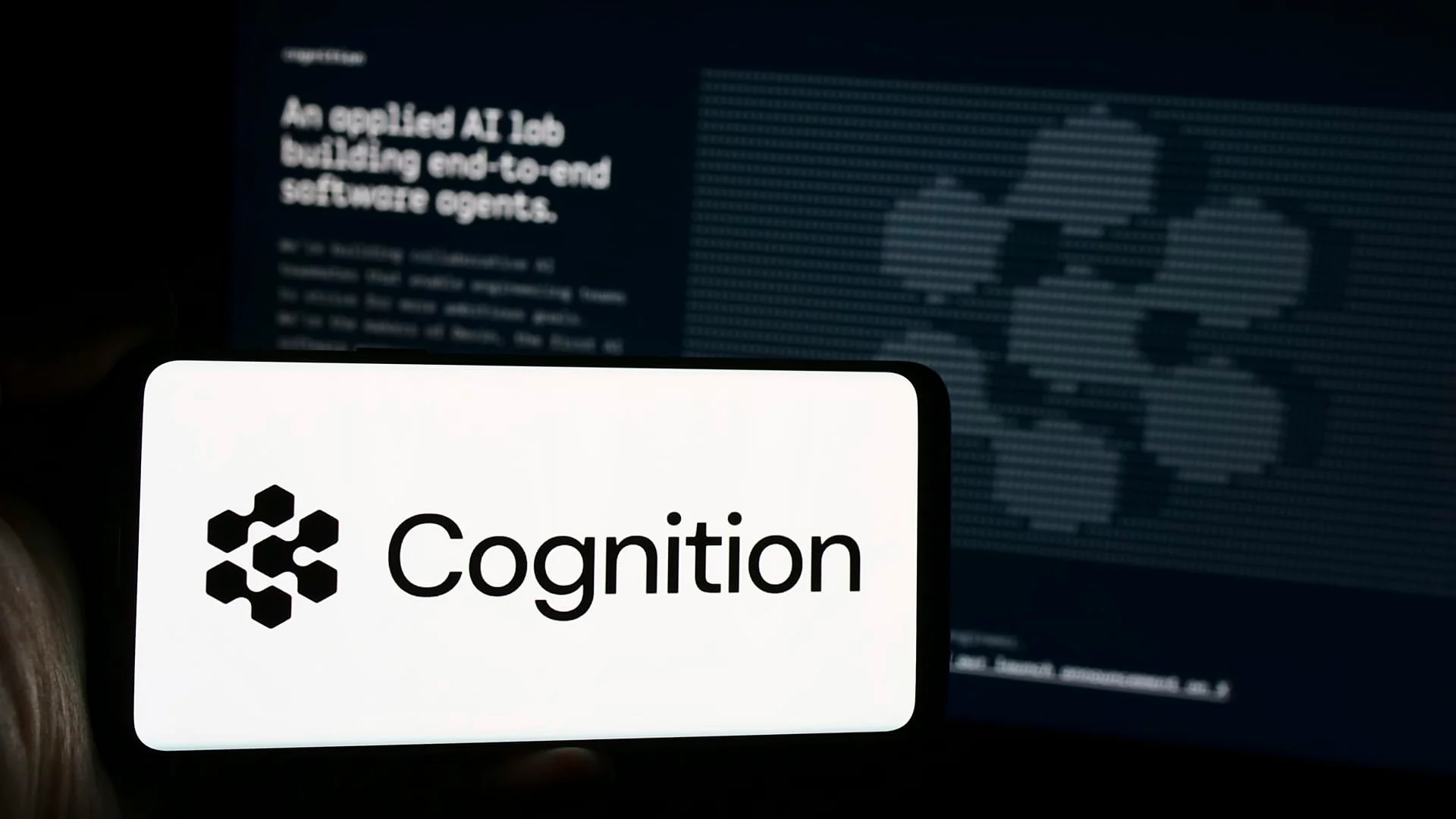Table of Contents
What if artificial intelligence could not only answer your questions but independently complete entire projects from start to finish? This isn’t science fiction—it’s the reality that cognition.ai has created with Devin, the world’s first AI software engineer. But as remarkable as this achievement is, it represents just one facet of a broader AI revolution transforming how we work, create, and interact with digital content. From cognition.ai‘s autonomous coding to StoryPlay X‘s interactive storytelling, specialized AI assistants are reshaping every creative and technical field.
The evolution from simple chatbots to autonomous AI agents marks a paradigm shift in human-computer collaboration. While early AI tools required constant human guidance, today’s platforms like cognition.ai can plan, execute, and refine complex tasks independently. This transformation extends beyond coding into every domain where human creativity meets digital possibility.

Cognition.AI Unveiled: Setting New Standards for AI Autonomy
When cognition.ai introduced Devin, the technology world witnessed something unprecedented: an AI that doesn’t just assist with coding but performs as a full-stack software engineer. Unlike traditional coding assistants that suggest line completions or fix syntax errors, Devin from cognition.ai can take a project specification and deliver a complete, working application.
The magic of cognition.ai lies in its approach to problem-solving. Devin doesn’t simply generate code—it understands project requirements, breaks them into manageable tasks, writes and tests code, debugs issues, and even deploys applications. This autonomous capability represents a fundamental shift from AI as a tool to AI as a collaborator. When given a task like “build a website that tracks cryptocurrency prices,” cognition.ai‘s Devin will research APIs, design the architecture, implement features, and create a functional product without constant human oversight.
Real-world applications of cognition.ai have already demonstrated impressive results. In benchmark tests, Devin successfully completed 13.86% of real GitHub issues completely autonomously—a figure that might seem modest until you consider that previous AI systems achieved less than 2%. This isn’t about replacing human developers; it’s about amplifying their capabilities. While Devin handles routine implementation tasks, human engineers can focus on creative problem-solving and strategic decisions.
The technical architecture behind cognition.ai combines several breakthrough innovations. Long-term memory allows Devin to maintain context across extended projects, while its planning module breaks complex tasks into executable steps. Most importantly, cognition.ai incorporates a feedback loop that allows Devin to learn from its mistakes and improve over time. This isn’t just automation—it’s artificial intelligence that truly thinks about problems.
Interestingly, the principles that make cognition.ai revolutionary in coding—autonomy, contextual understanding, and creative problem-solving—are now being applied to other domains. Platforms like StoryPlay X bring similar sophistication to creative writing and interactive storytelling, showing how specialized AI can transform any field requiring both structure and creativity.
The AI Assistant Landscape: Comparing Platforms and Purposes
To understand cognition.ai‘s significance, we must examine it alongside other major AI platforms, each designed for specific use cases and user needs.
GitHub Copilot: The Coding Companion
Before cognition.ai changed the game, GitHub Copilot represented the pinnacle of AI-assisted coding. Integrated directly into development environments, Copilot excels at predicting what code you’re about to write and offering intelligent suggestions. Its strength lies in its vast training data from public repositories, allowing it to recognize patterns and suggest optimal implementations. However, unlike cognition.ai, Copilot requires constant human guidance—it’s a powerful autocomplete rather than an autonomous agent.
ChatGPT/GPT-4: The Generalist Genius
OpenAI’s ChatGPT became the public face of AI assistants, capable of discussing everything from quantum physics to cookie recipes. Its versatility makes it invaluable for brainstorming, research, and general problem-solving. Yet this breadth comes at the cost of depth—while ChatGPT can write code, create stories, or plan projects, it lacks the specialized capabilities of cognition.ai for software development or StoryPlay X for interactive narrative creation.
Claude (Anthropic): The Thoughtful Assistant
Claude prioritizes safety and accuracy, excelling at tasks requiring careful reasoning and nuanced understanding. Its ability to process extensive documents makes it ideal for research and analysis. However, this cautious approach sometimes limits creativity—while cognition.ai boldly tackles complete projects and StoryPlay X encourages wild narrative experimentation, Claude tends toward conservative, well-reasoned responses.
Cognition.AI: The Autonomous Developer
What sets cognition.ai apart is its end-to-end capability. Rather than assisting with development, it performs development. This autonomy extends beyond simple task completion—Devin understands project goals, makes architectural decisions, and delivers polished results. The limitation? This deep specialization currently focuses solely on software development, leaving other creative fields to different specialized platforms.
StoryPlay X: The Narrative Innovator
While cognition.ai revolutionizes how we build software, StoryPlay X transforms how we create and experience stories. Using AI to convert static narratives into interactive adventures, it represents the same principle of specialized AI excellence applied to creative writing. Just as cognition.ai understands code structure and logic, StoryPlay X comprehends narrative flow, character development, and reader engagement.

The Specialization Revolution: Why One-Size-Fits-All AI Falls Short
The success of cognition.ai illuminates a crucial truth about AI development: specialization beats generalization when solving complex domain-specific problems. While general-purpose AI assistants serve valuable roles, the future belongs to platforms that deeply understand their specific domains.
In software development, cognition.ai succeeds because it doesn’t just process code—it thinks like a developer. It understands dependencies, anticipates edge cases, and follows best practices specific to software engineering. This domain expertise allows it to make decisions that general AI would struggle with, like choosing appropriate design patterns or optimizing for performance versus readability.
The same principle applies across creative fields. Writers need AI that understands narrative structure, character arcs, and emotional pacing—capabilities that StoryPlay X specifically develops. Visual artists require AI familiar with composition, color theory, and stylistic conventions. Musicians benefit from AI that grasps harmony, rhythm, and musical emotion. Each field has unique requirements that specialized AI can address more effectively than generalist platforms.
This specialization trend mirrors human expertise. Just as you wouldn’t hire a generalist to perform brain surgery or design a skyscraper, specialized AI platforms like cognition.ai and StoryPlay X excel by focusing on specific domains. The depth of understanding required for autonomous operation in any field demands dedicated development and training.
Consider how cognition.ai approaches a coding project versus how ChatGPT might handle it. ChatGPT can certainly write code, but it treats each request in isolation. Cognition.ai‘s Devin maintains project context, understands how different components interact, and makes holistic decisions about architecture and implementation. Similarly, while ChatGPT can help write stories, StoryPlay X understands how to transform linear narratives into branching adventures, maintaining consistency across multiple story paths while creating meaningful player choices.
Creative AI Revolution: From Assistance to Co-Creation
The autonomous capabilities demonstrated by cognition.ai in software development inspire a crucial question: what would similar autonomy look like in creative fields? The answer is already emerging through platforms that apply AI not just as tools but as creative partners.
Traditional creative AI focuses on generation—write a poem, create an image, compose a melody. But true creative AI, inspired by cognition.ai‘s approach, should understand entire creative projects. This means grasping not just individual elements but how they combine into cohesive experiences. StoryPlay X exemplifies this evolution by treating stories not as static text but as dynamic experiences shaped by reader interaction.
The parallel between cognition.ai and creative AI platforms becomes clear when examining their approaches. Just as Devin doesn’t merely write code but architects entire applications, StoryPlay X doesn’t just generate text but constructs complete interactive narratives. Both platforms understand that modern digital products—whether software or stories—require more than just content; they need structure, interactivity, and user engagement.
This shift from assistance to co-creation fundamentally changes the creative process. Writers using StoryPlay X don’t just get help with prose; they gain a collaborator that understands how stories branch, how choices create meaning, and how different perspectives (first, second, or third person) affect reader immersion. The AI helps transform traditional manuscripts into living stories where readers become participants, making choices that genuinely affect outcomes.
The democratization effect mirrors what cognition.ai brings to programming. Just as Devin allows non-programmers to create functional software by describing what they want, StoryPlay X enables writers to create complex interactive narratives without learning programming or game design. The specialized AI handles technical implementation while creators focus on storytelling, characters, and emotional impact.
Real-World Applications: Choosing the Right AI for Your Project
Understanding when to use cognition.ai versus other AI platforms requires examining specific use cases and project requirements. Each platform excels in different scenarios, and often the best approach combines multiple specialized tools.
Software Development Projects
For building complete applications, cognition.ai stands alone. Imagine needing a custom inventory management system for your business. While ChatGPT could help you plan features and GitHub Copilot could assist with individual functions, only cognition.ai‘s Devin can take your requirements and deliver a working system. It handles database design, user interface creation, API integration, and deployment—tasks that would typically require a full development team.
Content Creation and Writing
Here’s where specialization becomes crucial. ChatGPT excels at generating blog posts, marketing copy, and general content. But for interactive storytelling, StoryPlay X offers unique capabilities. A novelist wanting to create an interactive version of their book wouldn’t just need text generation—they need understanding of narrative branching, reader agency, and how choices affect story outcomes. StoryPlay X provides this specialized knowledge, transforming static stories into dynamic experiences.
Code Optimization and Review
For developers actively writing code, GitHub Copilot remains invaluable for real-time suggestions and boilerplate reduction. However, for comprehensive code review and refactoring, cognition.ai can analyze entire codebases and suggest architectural improvements. The choice depends on whether you need in-the-moment assistance or comprehensive project analysis.
Educational and Training Materials
Creating interactive learning experiences showcases how different AI platforms complement each other. Cognition.ai could build the technical infrastructure for an educational platform, ChatGPT could generate explanatory content, and StoryPlay X could transform lessons into interactive scenarios where students learn through choice and consequence. This combination leverages each platform’s strengths.
The Future of AI Collaboration: Integrated Tool Chains
The true power of platforms like cognition.ai emerges when we consider them not as isolated tools but as components in integrated workflows. The future of AI assistance lies not in one platform doing everything but in specialized platforms working together seamlessly.
Imagine a workflow where cognition.ai builds the technical backend for an interactive story platform, StoryPlay X handles narrative creation and branching logic, and other specialized AI manages visual assets or sound design. Each component excels in its domain while APIs and integration layers allow smooth collaboration. This mirrors how human teams work—specialists collaborating rather than generalists attempting everything.
The API economy enables this integration. Cognition.ai could expose Devin’s capabilities through APIs, allowing other platforms to request specific development tasks. Similarly, StoryPlay X might offer narrative transformation services that other applications could utilize. This interoperability creates possibilities beyond what any single platform could achieve.
For organizations, this means building AI stacks tailored to specific needs. A game development studio might combine cognition.ai for engine programming with StoryPlay X for narrative design. A media company could use ChatGPT for initial content ideation, then transform promising concepts into interactive experiences with StoryPlay X. The key lies in understanding each tool’s strengths and orchestrating them effectively.

Frequently Asked Questions
Will Cognition.AI replace human programmers?
Cognition.ai augments rather than replaces human developers. While Devin can handle implementation tasks autonomously, human creativity, strategic thinking, and domain expertise remain irreplaceable. The platform frees developers from routine coding to focus on innovation and problem-solving.
How do I start using these AI platforms?
Most platforms offer accessible entry points. Cognition.ai currently has a waitlist for Devin access. StoryPlay X provides free trials for story transformation. ChatGPT and Claude offer immediate access with free tiers. Start with your specific need and choose the most specialized platform.
What are the pricing differences between platforms?
Pricing varies significantly. ChatGPT starts at $20/month, GitHub Copilot at $10/month. Cognition.ai pricing reflects its enterprise-level capabilities. StoryPlay X offers tiered pricing based on story complexity and reader engagement. Consider value delivered rather than just cost.
Who owns the rights to AI-generated content?
Generally, users retain rights to content created with AI assistance. Cognition.ai explicitly states users own code Devin creates. StoryPlay X ensures creators maintain full rights to their interactive stories. Always review specific platform terms for clarity.
Can these AI tools work together?
Increasingly, yes. While direct integration varies, outputs from one platform can feed into another. Cognition.ai could build systems that StoryPlay X stories run on. The AI ecosystem grows more interconnected daily.
Looking Ahead: AI’s Next Decade
Cognition.ai represents more than just advanced coding assistance—it’s a glimpse into AI’s autonomous future. As platforms like cognition.ai and StoryPlay X demonstrate, the next decade will see AI transitioning from helpful assistants to capable collaborators in every field.
The specialization trend will accelerate. Just as cognition.ai deeply understands software development and StoryPlay X masters interactive storytelling, we’ll see AI platforms for architecture that understand building codes and spatial design, AI for medicine that grasps diagnosis and treatment protocols, and AI for education that comprehends learning psychology and curriculum development.
Human creativity remains central to this future. Cognition.ai doesn’t eliminate the need for software architects—it empowers them to realize grander visions. StoryPlay X doesn’t replace storytellers—it gives them new canvases for their narratives. The future belongs to humans who understand how to orchestrate these specialized AI platforms, combining their capabilities to create experiences impossible for either humans or AI alone.
As we stand at this technological inflection point, one thing becomes clear: the age of general-purpose AI is evolving into an era of specialized excellence. Whether you’re building the next revolutionary app with cognition.ai or crafting immersive stories with StoryPlay X, the tools for unprecedented creation are at your fingertips. The only question is: what will you build?
Essential Resources
- Cognition Labs: Introducing Devin, the First AI Software Engineer – Official announcement and technical details
- The Rise of Autonomous AI: A New Era of Intelligent Automation – Analysis of AI’s impact on software engineering
- VentureBeat: Why Specialized AI Platforms Are the Future – Industry perspective on AI specialization trends

The idea of specialized AI assistants really resonates with me. One-size-fits-all solutions always felt limiting. As AI tools become more tailored to specific tasks, I can see how they could open up entirely new possibilities in creative and technical industries.